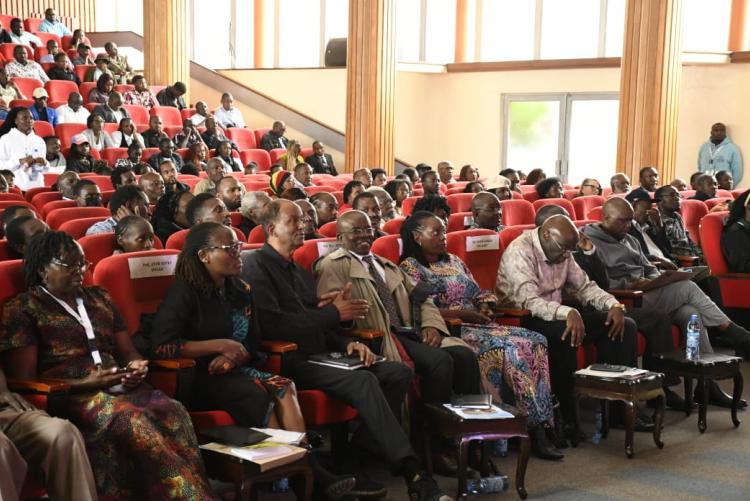The University of Nairobi, in collaboration with East African Educational Publishers (EAEP) and the Ngũgĩ wa Thiong’o Foundation, held a powerful and emotionally charged celebration on Friday, June 20, to honor the life, works, and enduring legacy of the late Prof. Ngũgĩ wa Thiong’o. The event, titled “Celebrating the Life and Works of Prof. Ngũgĩ wa Thiong’o,” took place at the historic Taifa Hall and drew hundreds of admirers, scholars, writers, students, and members of the public, both in-person and online. Rich in cultural depth and intellectual reflection, the day-long programme paid homage to one of Africa’s most influential literary figures and staunch advocates for African languages, cultural sovereignty, and social justice.
Prof. Ngũgĩ wa Thiong’o, who once walked the halls of the University of Nairobi as a professor and revolutionary thinker, was remembered not only for his literary brilliance but also for his transformative impact on academia. Speaking on behalf of the Vice Chancellor, Prof. Margaret Hutchinson, Deputy Vice Chancellor Prof. Ayub Gitau noted that ‘it was at the University of Nairobi where Prof. Ngũgĩ and his colleagues initiated a literary revolution that profoundly reshaped how literature was taught, leading to the renaming of English departments to Literature departments around the world. She further emphasized that the university served as the birthplace of Ngũgĩ’s most influential theories, including his call to decolonize the mind, and described him as a seminal figure who helped shift the intellectual center of gravity from colonial paradigms to African consciousness.
“Prof. Ngũgĩ was an important voice that expressed African thought and philosophy during the fabulous decades of the late 20th century. Without doubt, he pioneered the African literary revolution that sought to distinguish itself from the European and American models that contributed to both the physical and psychological colonization of Africa,” she stated.
The Dean of the Faculty of Arts and Social Sciences echoed these sentiments, affirming that Ngũgĩ’s ideas remain alive and active within the institution’s curriculum, lectures, and the activism of its students. His intellectual spirit, they noted, continues to inspire generations at the University of Nairobi and beyond. T
Prof. Miriam Maranga-Musonye, Chair of the Department of Literature, who shared that Ngũgĩ once occupied the very office she now holds. She recalled how Ngũgĩ, together with literary giants Taban lo Liyong and Awuor Anyumba, challenged Eurocentric literary frameworks and recentered African narratives, languages, and resistance as the core of their academic inquiry. “To the family,” she added, “I know he was more than all I have said. He was Baba, Awa, Guka, and much more. Your loss is profound, and we pray that God may comfort you through the power of his memory and his enduring legacy.”
The tribute was further enriched by the presence of high-profile guests, including Hon. Martha Karua, veteran politician and human rights defender, who described Ngũgĩ as “a fearless voice for the oppressed and a relentless defender of cultural identity and decolonization through literature.”
The Chief Guest, Hon. Yusuf Hassan, Member of Parliament for Kamukunji, praised Ngũgĩ as a pan-African visionary who challenged Africa to look inward—to reclaim its languages, value its stories, and honour its struggles. “Ngũgĩ was not just a Kenyan icon,” he said, “but a beacon for the entire African continent.”
Throughout the day, attendees were treated to a wide array of moving tributes and artistic presentations. These included reflections from fellow writers, former students, and literary scholars; poetry recitals inspired by Ngũgĩ’s enduring themes of resistance, memory, and liberation; dramatic adaptations of scenes from his celebrated works The Trial of Dedan Kimathi and I Will Marry When I Want; as well as musical performances and traditional dances celebrating Kenya’s cultural richness. A special photo exhibition captured the arc of Ngũgĩ’s remarkable life—from his early days in Limuru to his global acclaim as a writer, thinker, and activist. Live readings of excerpts from his books brought his prose to life, while virtual participation allowed audiences around the world to share in the collective remembrance and ongoing dialogue sparked by his work.
One of the most poignant parts of the event came from the family of the late professor, whose heartfelt tributes blended literary elegance with emotional depth. His son, Tee Ngũgĩ, delivered a recorded reading of his original poem “A Crying of Winter,” composed in mourning. His voice, heavy with emotion, echoed through Taifa Hall, capturing the deep and enduring love of a son for his father. Another son, Kimunya wa Ngũgĩ, gave a live reading from Devil on the Cross—a novel famously written by Prof. Ngũgĩ while imprisoned—bringing to life the fearless creativity of a writer who transformed adversity into art. The Ngũgĩ Family Ensemble performed a touching tribute that combined song, poetry, and a virtual excerpt from one of Ngũgĩ’s works. Their performance was both a personal farewell and a collective affirmation of the legacy he leaves behind—not just as a father and family patriarch, but as a voice that awakened generations.
In every word spoken, every note sung, and every memory shared, the event reaffirmed Ngũgĩ wa Thiong’o’s lasting vision: that African stories, told in African languages and voices, are essential to the liberation and dignity of the continent. The atmosphere at Taifa Hall was one of reverent remembrance and quiet strength. As tributes flowed and performances unfolded, one message was clear: Prof. Ngũgĩ’s legacy is not confined to the past. It lives on—in books, in classrooms, in movements, and in the hearts of all who believe in the power of language, culture, and self-determination.

